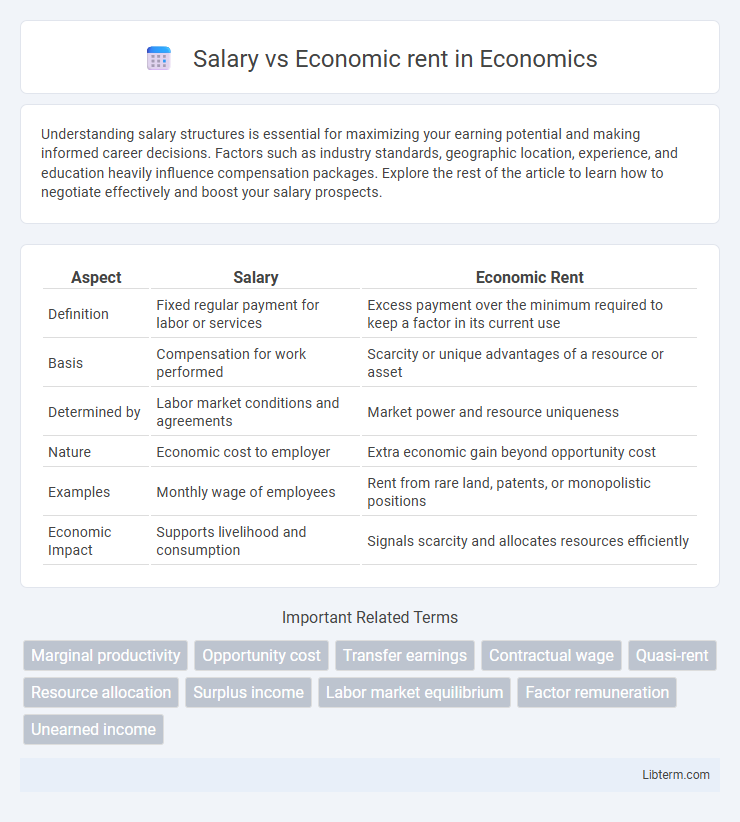Understanding salary structures is essential for maximizing your earning potential and making informed career decisions. Factors such as industry standards, geographic location, experience, and education heavily influence compensation packages. Explore the rest of the article to learn how to negotiate effectively and boost your salary prospects.
Table of Comparison
| Aspect | Salary | Economic Rent |
|---|---|---|
| Definition | Fixed regular payment for labor or services | Excess payment over the minimum required to keep a factor in its current use |
| Basis | Compensation for work performed | Scarcity or unique advantages of a resource or asset |
| Determined by | Labor market conditions and agreements | Market power and resource uniqueness |
| Nature | Economic cost to employer | Extra economic gain beyond opportunity cost |
| Examples | Monthly wage of employees | Rent from rare land, patents, or monopolistic positions |
| Economic Impact | Supports livelihood and consumption | Signals scarcity and allocates resources efficiently |
Understanding Salary: Definition and Components
Salary represents regular, fixed compensation paid by employers to employees for their labor or services, typically expressed as an annual or monthly amount. It includes base pay, bonuses, allowances, and benefits, which together form the total remuneration package. Economic rent, in contrast, refers to payment exceeding the minimum amount necessary to keep a resource or factor of production in its current use, highlighting a key difference in income classification.
What Is Economic Rent? Core Concepts
Economic rent represents the excess payment made to a factor of production beyond what is necessary to keep it employed in its current use, differing from salary, which is the regular wage received for labor. It arises due to scarcity or unique advantages that a resource or individual possesses, such as land, patents, or specialized skills. Understanding economic rent is crucial for analyzing resource allocation, market efficiency, and income distribution within an economy.
Key Differences Between Salary and Economic Rent
Salary represents a fixed compensation paid to employees for their labor or services, typically agreed upon contractually and subject to taxation. Economic rent, in contrast, refers to the excess payment made to a factor of production above its opportunity cost, often arising from scarcity or unique advantages such as land, patents, or monopolistic position. While salary is tied directly to work performed, economic rent is unearned income derived from ownership or control of scarce resources.
Factors Influencing Salary Levels
Salary levels are influenced by factors such as education, experience, industry demand, and geographic location, which determine an individual's market value and earning potential. Economic rent arises when a worker earns above the competitive equilibrium wage due to scarce skills, bargaining power, or unique job positions, reflecting payment beyond the opportunity cost. Understanding the interplay of labor market supply, human capital investment, and firm profitability helps explain variations in salary and economic rent across professions.
Determinants of Economic Rent in the Market
Economic rent arises when a factor of production, such as labor or land, commands payment beyond its opportunity cost due to scarcity or unique advantages. Determinants of economic rent include resource scarcity, differential productivity, and market imperfections that create barriers to entry or limited substitutability. Unlike salary, which represents compensation aligned with market equilibrium, economic rent results from limited supply and consumer willingness to pay more for exclusive access or superior quality.
The Role of Labor Market Dynamics
Salary represents the regular compensation paid to workers based on skills, experience, and job performance within competitive labor markets, whereas economic rent refers to earnings exceeding the minimum amount necessary to keep labor employed, often arising from market frictions or unique advantages. Labor market dynamics, such as supply-demand imbalances, union influence, and job mobility constraints, significantly shape the distribution between salary and economic rent by affecting wage-setting processes. Understanding these factors is essential for analyzing wage differentials and labor income distribution across industries and occupations.
Economic Rent in High-Skill Professions
Economic rent in high-skill professions refers to the excess earnings skilled workers receive beyond their opportunity cost, driven by unique talents, scarce qualifications, or market power. Unlike salary, which compensates for labor supplied, economic rent captures the premium arising from barriers to entry, specialized knowledge, or inelastic supply of top professionals such as doctors, engineers, and IT specialists. Understanding economic rent is crucial for analyzing wage disparities and the true value attributed to exceptional human capital in competitive industries.
The Impact of Scarcity on Economic Rent
Scarcity significantly elevates economic rent by limiting the availability of unique talents, resources, or locations, which drives bids above standard salary levels. Unlike salaries determined by competing labor market wages, economic rent captures the excess earnings generated due to restricted supply and high demand in scarce factors. This dynamic often results in disproportionate income for rare skills or exclusive access, reflecting the premium scarcity imposes on economic rent beyond regular compensation.
Real-World Examples: Salary vs Economic Rent
Salary represents fixed compensation paid to employees for services rendered, such as the $60,000 annual pay of a software engineer at a tech firm. Economic rent refers to income earned over the minimum required to keep a factor of production in its current use, exemplified by a landlord charging premium rent for prime city-center real estate, far above maintenance costs. Real-world examples include athletes like LeBron James earning multimillion-dollar salaries plus economic rent from endorsement deals tied to their unique skills and market demand.
Implications for Employees and Employers
Salary represents the fixed regular payment employees receive for their labor, reflecting market-determined wages based on skills and experience, while economic rent refers to excess earnings above the minimum amount necessary to keep a resource in its current use. For employees, understanding the distinction highlights opportunities to negotiate higher pay if they possess unique talents or scarce skills generating economic rent. Employers benefit from recognizing economic rent as it indicates potential cost efficiencies or competitive advantages but must balance compensation to retain talent without overpaying beyond productive contributions.
Salary Infographic

 libterm.com
libterm.com